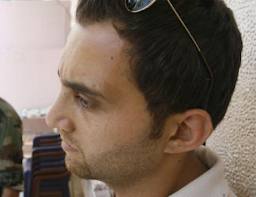 Reporters Without Borders and the Swiss-based human rights NGO Alkarama condemn the six-month jail sentence that Lebanese journalist Rami Aysha received in absentia from a Beirut military court last week on a charge of purchasing firearms.
Reporters Without Borders and the Swiss-based human rights NGO Alkarama condemn the six-month jail sentence that Lebanese journalist Rami Aysha received in absentia from a Beirut military court last week on a charge of purchasing firearms.
Arrested on 30 August 2012 while researching a story on arms trafficking in Beirut’s southern suburbs, Aysha was released a month later pending trial. He was abroad for professional reasons when the trial was finally scheduled for 25 November and, through his lawyer, requested its postponement until 8 December.
But the judge in charge of the case rejected the request, went ahead with the hearing and convicted him absentia.
Aysha has told Reporters Without Borders and Alkarama that, as a result of the judge’s ruling, his name has been passed to the Immigration Department and that the border police are set to arrest him at the airport on his planned return to Lebanon on 8 December.
Thereafter, he said, he is to be held indefinitely by the Public Security Department pending a new trial before the military court. He will still be in detention at the time of the new trial, whichwhich could result in the confirmation of the judgement and sentence to prison.
“We call for the definitive withdrawal of all the proceedings against Aysha and the quashing of his conviction,” Reporters Without Borders said. “As a journalist, Aysha was doing a story on arms trafficking when arrested. It is crucial that the Lebanese judicial authorities distinguish between journalistic investigation and illicit trafficking.
“Any confusion of this kind poses a major threat to the future of freedom of information in Lebanon. We also condemn the use of military courts to prosecute journalists. The authorities must leave Aysha in peace when he returns to Lebanon on 8 December. His arrest would be unacceptable.”
Alkarama said: “Trials of civilians before military courts such as Aysha’s trial cannot be regarded as fair. Under article 14 of the International Covenant on Civil and Political Rights, everyone is entitled to a fair and public hearing by a competent, independent and impartial tribunal.”
“Trials of civilians before military courts such as Aysha’s trial cannot be regarded as fair. Under article 14 of the International Covenant on Civil and Political Rights, everyone is entitled to a fair and public hearing by a competent, independent and impartial tribunal.” Alkarama
“This Beirut military court’s shortcomings include its failure to investigate the abuses suffered by Aysha although he told the investigating judge at the first hearing that he had been tortured in detention. It can therefore not be ruled out that statements made under duress were used during the proceedings. This accentuates the already deeply unfair nature of this trial and conviction.”
A reporter for such international news media as Time and Spiegel Online, Aysha was abducted in a southern part of the capital on 30 August 2012, while researching his story on arms trafficking and was handed over to the Lebanese intelligence services and then the military police, and finally placed in prison. During this process, he was repeatedly interrogated and tortured.
He was released a month later, on 27 September 2012, on bail of 1 million Lebanese pounds (515 euros) pending trial before a military court on a charge of purchasing firearms.
“The Lebanese authorities are still hampering Aysha’s work as a journalist but have never investigated the abuses to which he was subjected, namely, his arbitrary arrest, his subsequent incommunicado detention as well as the torture and ill-treatment,” Reporters Without Borders and Alkarama added.
“Those responsible for this abusive treatment have never been identified and punished. Lebanese journalists must be able to cover so-called ‘sensitive’ subjects without being harassed by armed groups, political parties or the authorities.”
Arms trafficking is not the only taboo subject that is dangerous for Lebanese journalists. Corruption is another problematic subject. An Al-Jadeed TV crew was physically attacked by Customs General Directorate officials while trying to do a report on corruption at Beirut international airport on 26 November.
The Al-Jadeed crew said that, after being denied a request for an interview with interim customs director Shafiq Mehri for their story, they went to the headquarters of the General Directorate for Customs in central Beirut to reiterate their request and, while outside, were attacked by customs officers who hit them and broke their equipment.
When civil society representatives arrived in show of solidarity with the TV crew, both they and the journalists were again attacked by the customs officials.
Soldiers were eventually deployed to end the fighting. Four Al-Jadeed journalists – Riyad Qobeissi, Ali Shreim, Adib Farhat and Ali Khalifeh – were detained and questioned by police, and then released at around 7 pm.
The journalists are nonetheless facing prosecution as a result of a complaint brought by the Customs General Directorate. The TV station has also filed a complaint.
On 3 December, a military prosecutor charged two customs officers – Col. Ibrahim Shamseddine (who holds a senior position) and Mohammad Al-Sagheer – with “using force and beating” journalists, and transferred the case to a military investigating judge.
Reuters

Leave a Reply
You must be logged in to post a comment.